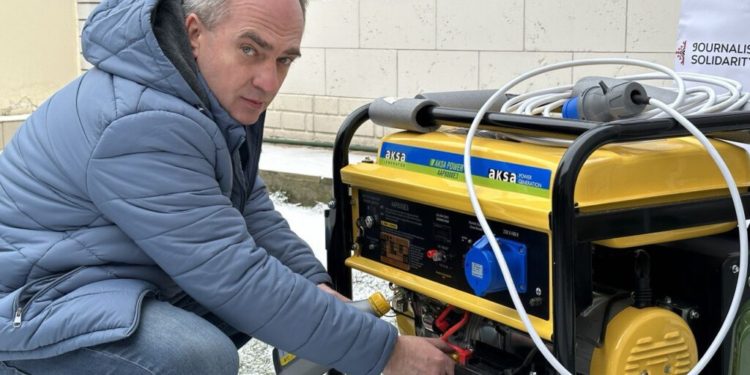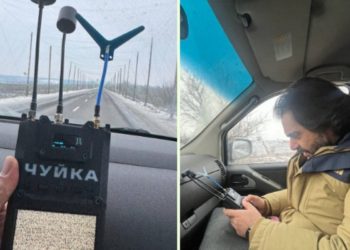“What saves us is that we are stationed in a building that is connected to a strategic line, so our electricity is practically never turned off,” Liudmyla Bosyk, the head of the independent media outlet Holosy Polissia from Volodymyrets, Rivne Region, answered a question about how work is done during blackouts. According to her, the newsroom of the Visnyk Polissia newspaper is also located in the same building. So, you could say that these media outlets are lucky. However, this is more of an exception to the general rule – newsrooms often operate in conditions of frequent power outages. However, newspapers, news feeds, YouTube channels, websites, and social networks are filled… But at what cost?
The National Union of Journalists of Ukraine (NUJU) has asked media professionals to share their work plans for newsrooms during blackouts. Fifty-six media professionals from different regions of Ukraine responded. Of these, 17 people plan to continue working in the office, 10 plan to work remotely from home, and the remainder plan to combine office work with remote work.
When asked what energy equipment they need, the majority, 46 survey participants, said that charging stations are needed. Several more respondents expressed interest in power banks, generators, and financial assistance. And only the Holos Petrivshchyny radio from the Kirovohrad Region does not need help, because it has a powerful generator.
We also asked the heads of several media outlets about their current operations and the changes they have made during the period of blackouts.
Even if there is light, this does not mean that there is Internet
The network of hyperlocal publications, Local Media, comprises 11 publications covering 11 communities in the Chernihiv Region. Therefore, it has its own specifics: media workers work remotely in Mena, Kholmy, Berezna, Sosnytsia, etc. All communication is carried out through messengers, via the Internet. And since this is electronic media, the availability of electricity is very important for it.
Serhii Bondarenko, the editor-in-chief of the network of hyperlocal publications Local Media:
– In fact, it is difficult to work, because in the Chernihiv Region, there is a very big problem with electricity. Some outages last several hours, and sometimes they are shut off for 12-14 hours; others are intermittent, varying by the hour, depending on the results of enemy shelling. I am glad that we stocked up on energy equipment through various grant programs. We have several Ecoflo stations, which are enough for editors and a production editor. We also have power banks that journalists use to charge their phones.
However, even if you have electricity, this does not necessarily mean that you have access to the Internet. Local providers strive to provide uninterrupted internet, but it doesn’t always work out, as there are sometimes interruptions with gasoline for generators, mobile internet, and other factors. Even fiber optics doesn’t always save the day. All this leaves its mark on technology, on business processes in the newsroom. Of course, news is published, interviews are conducted and written, reports are published, and videos are shot. But not everything is that simple. For several days, we couldn’t properly upload a large video to a file-sharing server and edit a big story because the internet barely worked and there wasn’t enough power. And that’s all – time and nerves… Of course, when YouTube takes a long time to load, I try to find different ways. We hope that we’ll find a way out here, too. We would be happy if we had the opportunity to access a powerful station or equipment that would allow us to work for 8-12 hours, at least with a laptop, charge phones, and maintain an internet connection. However, we must adapt to these conditions.
“Catch” a few working hours.
Buryn is a small border town in the Sumy Region, just 26 kilometers from the russian border. Since February 24, 2022, the city has experienced 38 days of temporary occupation. And then, for the first time since World War II, the publishing of the Ridnyi Krai newspaper was suspended. However, journalists continued to work, informing the population about community events on their Facebook page.
Liudmyla Maznova, the editor-in-chief of the Ridnyi Krai newspaper:
– Immediately after the de-occupation, we started planning the printed version of the newspaper. The issue was published on May 22. Since then, there has been no break, although this year has been particularly difficult for the team, which includes three women. Due to the fall and arrival of enemy drones, the premises rented by the newsroom from “Ukrposhta” were damaged twice, blast waves broke the windows, and office equipment was damaged. But we continued to work. The newspaper is published weekly, and subscriptions are open for 2026.
Maya Rylova, Deputy Director of the Ridnyi Krai LLC:
– Now the main difficulty for the newsroom is winter without electricity, –– Outages in Buryn last 10–15 hours a day. If the whole day passes without electricity, then work on the issue literally stops, as there are no alternative energy sources; what was there before is no longer working. We do not have the funds to purchase, for example. A charging station. At home, the light is also supplied according to schedules. We gather in the newsroom when we manage to “catch” a few working hours, because in the evening it is difficult to get there in the dark. We have to work in such difficult conditions. However, we understand that “Ridny Kray” is intended for the readers of the Buryn, Duboviyazivka, and Khmelivsk Communities, where the newspaper is distributed. It is not just a local press, but a part of everyday life.
In Spartan conditions
This is how the newsroom of the Krynychanska newspaper Novi Rubezhi in the Dnipropetrovsk Region works. There is no heating at all. They refused it even before the start of the full-scale invasion, because it was expensive and there was nothing to pay for it. During the cold season, the editorial staff gathers in the smallest office, warming themselves with electric heaters. However, when there is no urgent need to be in the office, they switch to remote work. They are already used to it. However, during blackouts, when the electricity is turned off, the charging stations, purchased as part of a grant project with the assistance of the NUJU, come to the rescue.
Halyna Lytovchenko, the editor of the Novi Rubezhi newspaper:
– For example, on November 11 in the morning, there was light, at 3 p.m., they turned it off, and until the 17th, we worked thanks to charging stations. On November 12, only until 12 p.m. So, we didn’t sit around until nightfall. Thanks to projects and grants, we purchased charging stations. The outage only recently began, so we are adapting. We either work in the newsroom or at home, communicating via the Internet. We get by. Thanks to the Union for its support, our regional organization also always helps us a great deal. If there is information about a project in which we can participate, we are notified, and then we write a grant. Of course, sometimes we pass, sometimes we don’t; all this is not easy. But more than blackouts, we are worried about subscriptions. The circulation has dropped threefold – it was 3,500 through Ukrposhta, and now we cannot issue more than a thousand. Postal services are very expensive, and the quality is not good, especially when it comes to mobile branches. People are shocked and refuse to subscribe.
Clear planning helps
In addition to preparing the publication itself, the editorial staff of the Zhyttievi Obriyi newspaper from Khmilnyk, Vinnytsia Region, has been actively volunteering since the beginning of the full-scale invasion and during the subsequent blackouts. They recently held an information campaign, during which they collected a million hryvnias and purchased 100 drones. Of these, 30 drones have already been handed over to the fighters fighting in Pokrovsk. Clear planning helps to survive the blackouts.
Oleksandr Okolodko, editor of the Zhyttievi Obriyi newspaper:
– The lights don’t turn off all the time. So, I plan my work – when I need to work on the website, when on the newspaper, how to design it, etc. Of course, I would like everything to be more efficient, so that we would be the first to report, but no, it doesn’t always work out. Yes, there is some inconvenience, although I can’t say that the outages are a big problem for me. We have a generator, but I haven’t used it yet. Frankly, I’m more worried about the problems with Ukrposhta than the outages.
Earlier, we provided you with a short course on energy literacy, or how to stay “connected” during a power outage.
Inna Kosianchuk
NUJU Information Service

 THE NATIONAL UNION OF
JOURNALISTS OF UKRAINE
THE NATIONAL UNION OF
JOURNALISTS OF UKRAINE
















Discussion about this post